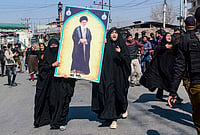Karnataka minister Priyank Kharge has come in support of CM Siddaramaiah's decision to revoke the restrictions placed by the previous BJP on hijab.
Priyank Kharge chimed into the raging Hijab controversy while taking at the previous BJP government in the state.
The son of Congress national president Mallikarjun Kharge, the cabinet minister is also the Chairman for Communications of the KPCC.
He was reacting to allegations by the opposition BJP that the ruling party was doing “appeasement politics” and playing “divide and rule”.
Kharge asserted that the decision was as per the law and hit out at the saffron party by saying they should first “set their own house in order”, NDTV reported.
“Whatever the Karnataka government is doing is as per the law and framework of the Constitution. BJP has no work to do, they should set their house in order first,” he said.
The Karnataka unit of the BJP is heavily opposing the lift on the Hijab ban, B Y Vijayendra stating that the Congress-led government in the state is “dividing young minds along religious lines”.
"CM Siddaramaiah's decision to withdraw the Hijab ban in educational institutions raises concerns about the secular nature of our educational spaces. By allowing religious attire in educational institutions Siddaramaiah government is promoting dividing young minds along religious lines, potentially hindering the inclusive learning environment," he said in a social media post.
The Hijab row first started in January last year when a Government Pre-University College in Udupi allegedly denied entry to six female students who were dressed in headscarves (hijab).






















